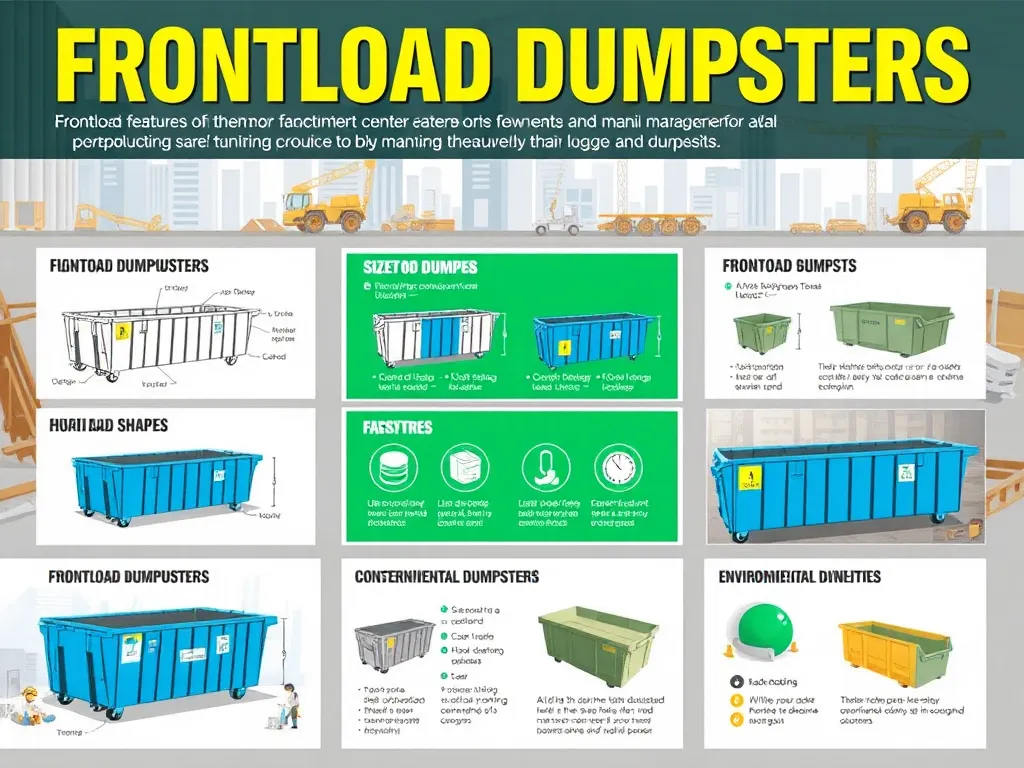Everything You Need to Know About Front-load Dumpsters

Understanding Front-load Dumpsters: A Comprehensive Guide
Front-load dumpsters are a popular waste management solution for businesses and residents alike. Designed for efficiency and ease of use, these dumpsters are typically used for commercial purposes but can also be beneficial for residential waste management. Their unique characteristics, such as a front-loading design, allow for quick access and easy loading, making them an ideal choice for environments where space is limited and waste is generated frequently.
Unlike traditional roll-off dumpsters, front-load dumpsters have a more compact design that can fit conveniently in tight spaces. They are available in various sizes, making them versatile for different waste disposal needs. The front-loading feature means that garbage trucks equipped with an automatic loading mechanism can lift and empty the containers quickly, making the waste collection process more efficient and reducing the time spent on each site.
The structural design of front-load dumpsters not only aids in efficient loading and unloading but also provides a level of accessibility that is unmatched by other dumpster types. Businesses frequently choose front-load dumpsters because they can be placed in alleyways or near buildings with minimal disruption. This accessibility is crucial for maintaining cleanliness and ensuring that waste is disposed of in a timely manner, contributing to the overall hygiene of the environment.
Additionally, front-load dumpsters are a more environmentally friendly option when compared to other waste disposal methods. Many municipalities encourage the use of these dumpsters because they promote recycling and minimize contamination. By making it easier to sort recyclables from regular waste, front-load dumpsters play a significant role in sustainable waste management practices.
For effective waste management, numerous options are available, as outlined by ACA-NY.
In conclusion, front-load dumpsters are an essential tool for effective waste management. Their design facilitates easy access, quick collection, and better organization of waste disposal, making them a preferred choice for many businesses and residents. Whether you are managing waste at a restaurant, office, or construction site, understanding the advantages of front-load dumpsters is vital for optimal waste management practices.
Benefits of Front-load Dumpsters
One of the primary benefits of front-load dumpsters is their cost-effectiveness. Businesses can save on waste disposal costs as these dumpsters require less frequent collection and can hold a considerable amount of waste. This means that companies can reduce the number of pickups per week or month, ultimately lowering their waste management expenses while maintaining a clean and organized environment.
Another significant advantage is the space-saving design of front-load dumpsters. Unlike roll-off dumpsters that require a considerable amount of room, front-load dumpsters have a smaller footprint and can be placed in compact spaces. This design is particularly beneficial for urban areas where space is at a premium, allowing businesses and properties to maintain their aesthetic appeal while managing waste efficiently.
Ease of access and use is another crucial benefit. The front-loading design allows for easy loading by staff and quicker collection by waste management services. Businesses can train their employees to dispose of waste without hassle, increasing productivity and ensuring that refuse does not accumulate on the premises, which fosters a healthier work environment.
Moreover, front-load dumpsters provide significant environmental advantages. They are often used in recycling programs, helping to divert waste from landfills. Their design facilitates the separation of recyclable materials, reducing contamination and enhancing recycling efficiency. This commitment to sustainable practices helps businesses promote an eco-friendly image while contributing to community waste reduction efforts.
Types of Front-load Dumpsters
Front-load dumpsters come in various standard sizes and capacities to cater to different waste disposal needs. Typically, they range from 2 to 8 cubic yards. Smaller dumpsters are ideal for small businesses or residential use, while larger models are suited for larger commercial operations. The variety of sizes allows businesses to select a dumpster that meets their specific needs without paying for unnecessary space.
In addition to standard sizes, there are specialized front-load dumpsters designed for different waste types. There are dumpsters for recyclable materials, organic waste, and construction debris, among others. These specialized options make it easier for businesses to manage specific waste streams effectively, optimizing their waste disposal protocols according to the nature of their operations.
It's also important to compare front-load dumpsters with roll-off containers. While roll-off dumpsters are typically used for temporary projects such as renovations or heavy debris removal, front-load dumpsters are ideal for ongoing waste disposal. Front-load dumpsters offer regular collection services, making them a better choice for businesses with consistently generated waste as opposed to project-based needs.
Choosing the Right Front-load Dumpster Service
When selecting a front-load dumpster service, it's essential to consider several factors. Businesses should assess their waste generation volume to determine the appropriate size and frequency of dumpster collection. Understanding local regulations regarding waste disposal can also impact the choice of dumpster provider. Each area may have unique requirements, and compliance is critical for successful waste management.
It's vital to ask specific questions to your front-load dumpster provider to ensure you understand their services fully. Questions about pricing structures, pickup schedules, and types of waste accepted can provide clarity and help avoid surprises later on. Inquiring about their recycling programs and how they handle different waste types can also provide valuable insights into their sustainability efforts.
Additionally, understanding rental agreements is crucial when choosing a front-load dumpster service. Businesses should carefully review the terms of service, including any potential fees for overage or damage, to avoid any unexpected costs. A clear and comprehensive rental agreement can help clarify the responsibilities of both parties, ensuring a smooth and efficient waste management process.
Front-load Dumpsters and Waste Management
Front-load dumpsters play a critical role in efficient waste disposal. Their design allows for quick and easy access, promoting timely waste removal that helps maintain cleanliness and hygiene in various settings. By facilitating a regular waste collection schedule, businesses can control waste accumulation and promote a more organized environment, which is essential for operational efficiency.
To maximize the capacity of front-load dumpsters, it's vital to implement best practices for loading. Users should flatten boxes, break down large items, and avoid overfilling the dumpster to ensure proper waste loading. Properly loading the dumpster can prevent overflow, maintain cleanliness around the unit, and facilitate the timely and efficient collection of waste by service providers.
Front-load dumpsters also have a significant impact on recycling efforts. By providing designated containers for recyclables, businesses can facilitate the separation of waste streams. This promotes recycling practices and minimizes contamination, leading to improved recycling rates. Emphasizing recycling efforts aligns with sustainability goals and can enhance a business’s reputation among environmentally conscious consumers.
Common Misconceptions about Front-load Dumpsters
There are several misconceptions regarding the pricing of front-load dumpsters. Some businesses may assume that front-load dumpster services are significantly more expensive than other types, but this is often not the case. When considering the frequency of pickup and the dumpster's capacity, the overall expenses can be competitive or even lower than roll-off options for businesses with consistent waste generation.
Some users may also question the usability of front-load dumpsters, believing that they are complicated to operate. In reality, these dumpsters are designed for ease of use, allowing employees to dispose of waste quickly and efficiently without significant training. Moreover, waste management companies typically provide guidance on optimal loading practices to ensure that users can maximize the benefits of the systems in place.
Lastly, there is a common belief that front-load dumpsters require excessive space. While they do take up some room, their compact design allows them to be placed in tighter areas compared to larger roll-off dumpsters. Many businesses find that they can fit front-load dumpsters in alleyways or alongside buildings while maintaining accessibility for waste collection services.
Maintenance and Care for Front-load Dumpsters
Maintaining cleanliness is essential for front-load dumpsters to prevent unpleasant odors and pests. Regularly cleaning the exterior and interior of the dumpster ensures that any spills or waste residues don't attract unwanted animals or create hygiene issues. Businesses can schedule periodic cleanings or use pressure washing to keep the dumpster in good condition.
Routine maintenance is also necessary to ensure front-load dumpsters remain in good operational condition. Providers may offer maintenance services, including inspecting the dumpsters for damage, rust, or wear and tear. Regular maintenance can prolong the lifespan of the dumpster and prevent downtime due to repair needs, ultimately saving businesses money.
Lastly, there are signs indicating the need for dumpster repair or replacement. If users notice persistent leaks, structural damage, or poor performance during pickups, it may be time to consult the dumpster provider. Addressing these issues promptly helps maintain an efficient waste management operation and ensures continued service without interruptions.
